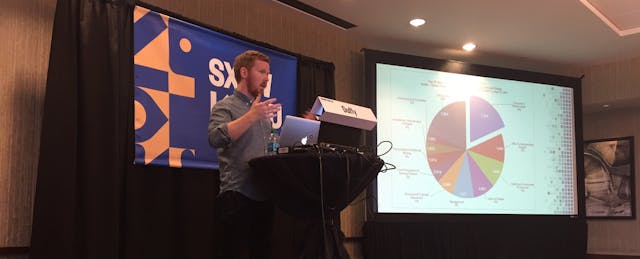Sean Duffy gets emails from educators asking him for advice on how they can leave their teaching careers for an edtech job on a weekly basis.
It’s a topic Duffy is well-versed in, as he made that transition himself. At a recent panel at SXSW EDU, he explained why “tech-enabled” teachers in particular have a trend of leaving the classroom and entering careers in tech—especially education technology.
Why Teachers Make the Switch
There are a variety of reasons why teachers leave the classroom, Duffy said. But one of them, he contended, is that they aren’t treated like professionals. Even though teachers go through professional development activities, they aren’t always respected and their opinions aren’t always valued, he claimed.
Pay is another factor. He added that while teachers are paid less than private sector professionals, they’re expected to do more.
“When I left the classroom and started my first job outside of that...honestly I felt like it was a joke,” Duffy said. “I was told, ‘your deadline to do this is, you have a week to do this,’ and I would get it done within a day, because I was just used to going at that crazy pace that teachers go at.”
He cited statistics from a job postings report the Austin Chamber of Commerce put out in March 2017 about employer demands in the Austin metropolitan area. Software developers working in applications had a median salary of $105,150, whereas the Bureau of Labor Statistics says that the median salary for kindergarten and elementary school teachers was $55,490 per year in 2016.
Duffy added that it’s challenging for K-12 teachers to advance their careers outside of moving into administrative roles. Instead, what they end up doing is taking extra work for additional money. When he was a teacher, he also coached, and found “every way” he could get “a little bit extra” in his paycheck each month. He has found better work-life balance in tech, and now works as the senior partnerships manager at Capital Factory, a startup incubator in Austin.
“No grading papers on weekends, although maybe the argument can be made that with careers in tech, we’re answering emails on the weekend instead of grading papers,” Duffy said.
And Duffy thinks 401ks and retirement plans are “much more viable” in tech. He said when he was teaching in Colorado, there was uncertainty about the state’s retirement program.
How Teachers Can Make the Switch
Duffy said teachers leaving the classroom or considering leaving the classroom often know what their skillset is, but don’t know how to translate that to the private sector. He gave the audience a few examples of people who’ve made the transition.
One of his former teaching colleagues went to a coding bootcamp and is now a software developer. Another friend of his taught for about three years before she became a school counselor. Now, after a few other jobs in between, she is the director of enterprise client accounts at a recruiting firm.
Duffy’s own path took him from the classroom, to edtech and to tech.
How Schools Can Get Teachers to Stay
Duffy said work environment makes a difference, and schools should take note. He pointed to schools instituting more relaxed dress codes, and also mentioned soft seating and lots of lighting, which Google, Facebook and his own employer have, as tactics that can encourage teachers to stay.
Flexible schedules are challenging to implement in schools, he said, but teachers could be given more flexibility with tasks like parent-teacher conferences.
Admitting that he doesn’t know all the answers, he told the audience there should be a focus on giving teachers more compensation, whether that’s in the form of salary or tools they need.
He also pointed to teachers attending community and professional organizations, like SXSW EDU.
“But full disclosure, this is actually how I got recruited out of the classroom, was coming to [this event] probably five years ago.”


